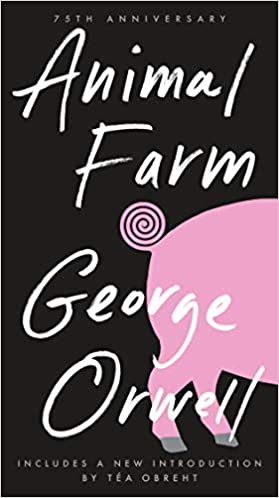
I read Orwell’s follow-up, 1984, a few years ago and really enjoyed it. This book is like 1984 in that it is critical of the government, but that is about the only parallel. This book, as the title implies, is about a group of barn animals. These animals are meant to represent the government and the people they govern. For the most part, the pigs are in charge with the dogs helping to protect the pigs. All the other animals are subservient to the pigs. This book was published towards the end of world war II, so the parallels between the animal characters and the actual people they are supposed to represent is not as obvious to me as it might have been to someone reading this book in say, 1950. The main pig is supposed to be former Russian dictator Joseph Stalin. I initially tried to match all the animal characters to their real-life counterparts while I was reading, but I found that the roles that each character was playing was still applicable to any government. The story still shows how words and laws can be twisted to meet the needs of those in charge.
There are only a few human characters named in the story. The most prominent one was Mr. Jones. Mr. Jones was the farmer in charge of all the animals at the beginning of the story. Mr. Jones is not the greatest person, for he drinks too much, and keeps the farm running in a somewhat sloppy manner. The animals have bearable living conditions, but they could be better. These conditions create a rift between the animals and Mr. Jones. They also create an opportunity for the main pig, Napoleon, to seize control. In a great rebellion, the animals force farmer Jones off the farm and, in doing so, gain the ability to run the farm themselves. Initially it seems that the animals may have a better life in doing things for themselves, but the pigs lust for power and the other animals’ naivety create a much different situation.
The pigs are generally more intelligent than the other animals and make the rules for the farm. They also alter those rules over time to suit their lifestyle. The pigs present themselves as hard-working leaders that deserve extra privilege, but in reality, they are dictators that are taking advantage of those in their stead. The pigs continually change the rules so that they are able to enjoy the fruits of the other animals’ labor while the other animals endure an increasingly difficult existence. In changing the rules, the pigs also deny doing so, as they take the rules and modify a word here and there to change the overall meaning for their benefit and then deny doing so. Most of the animals cannot read very well or not at all, so the pigs have a rather easy time doing this. The few animals that do recognize what is going on, are outcast. They are either killed or driven out and portrayed in a traitorous manner. This is very much applicable today as government whistle blowers, such as Julian Assange, Edward Snowden, and Chelsea Manning demonstrate. The actors in this story may have changed over time, but the characters they are playing seem to be the same.
This book was a very easy read and quite enjoyable.
